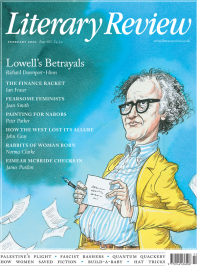Gill Partington
It’s a Murder to Solve
Cain’s Jawbone: A Novel Problem
By Edward Powys Mathers
Unbound 100pp £20
How on earth do you read a hundred-page novel when those pages have been published in no particular order and numbered seemingly at random? That’s the first conundrum for anyone approaching Cain’s Jawbone. The book is a much-anticipated reissue of an obscure, cult literary object that originally appeared over eighty years ago. It was the work of one Edward Powys Mathers, better known as Torquemada, The Observer’s infamous crossword compiler from 1926 until his death in 1939. Mathers, who was also a crime fiction aficionado, brought his two interests together in this unique hybrid of word puzzle and whodunnit, and in 1934 issued it alongside a selection of mind-bending verbal games, anagrams and ‘telacrostics’ in The Torquemada Puzzle Book. The intriguing premise was that this particular murder mystery had been ‘accidentally’ printed and bound in the wrong sequence. The challenge was to reorder it correctly, thus revealing the identities of the killers and their victims.
This new edition reproduces the story as a stand-alone book, and whereas original readers had to cut out the pages before rearranging them, modern ones are spared the trouble since Cain’s Jawbone is already in loose-leaf format. It’s the brainchild of Patrick Wildgust of the Laurence Sterne Trust, an organisation dedicated not only to Sterne but also to his legacy of literary game-playing and provocation. Enlisting Unbound to publish it on a subscription, crowd-funded basis, Wildgust redesigned it as a set of single-sided cards in a box, with a cover illustration by the inimitable Tom Gauld. It’s a lovely object. But as a reading experience, it’s deeply, deeply strange.
Conventionally, you might read a novel to follow the plot or characters, but not here. Both of those remain a mystery until the cards are reordered and the puzzle is solved. In their place we have to make do with a baffling stream of cryptic non sequiturs: ‘I set fire

Sign Up to our newsletter
Receive free articles, highlights from the archive, news, details of prizes, and much more.@Lit_Review
Follow Literary Review on Twitter
Twitter Feed
Margaret Atwood has become a cultural weathervane, blamed for predicting dystopia and celebrated for resisting it. Yet her ‘memoir of sorts’ reveals a more complicated, playful figure.
@sophieolive introduces us to a young Peggy.
Sophie Oliver - Ms Fixit’s Characteristics
Sophie Oliver: Ms Fixit’s Characteristics - Book of Lives: A Memoir of Sorts by Margaret Atwood
literaryreview.co.uk
For a writer so ubiquitous, George Orwell remains curiously elusive. His voice is lost, his image scarce; all that survives is the prose, and the interpretations built upon it.
@Dorianlynskey wonders what is to be done.
Dorian Lynskey - Doublethink & Doubt
Dorian Lynskey: Doublethink & Doubt - Orwell: 2+2=5 by Raoul Peck (dir); George Orwell: Life and Legacy by Robert Colls
literaryreview.co.uk
The court of Henry VIII is easy to envision thanks to Hans Holbein the Younger’s portraits: the bearded king, Anne of Cleves in red and gold, Thomas Cromwell demure in black.
Peter Marshall paints a picture of the artist himself.
Peter Marshall - Varnish & Virtue
Peter Marshall: Varnish & Virtue - Holbein: Renaissance Master by Elizabeth Goldring
literaryreview.co.uk